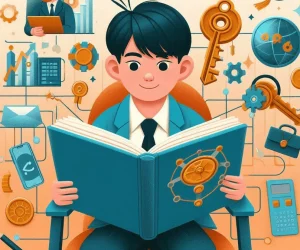How many parents have given their children years of music lessons, only to have the child one day announce: “I quit!”
It can be heartbreaking for the parent, not least because of the thousands of dollars they may have invested in lessons and instruments.
But inevitably, years later, the former teen will say, “I never should have quit the violin (or cello or viola)! I wish my parents had forced me to stick with it!”
Being a music school director for the past ten years, and the parent of three (an 8-year-old, a teenager, and a former teen), I have seen this sort of thing happen again and again. So I have made it one of my primary missions to create an environment that keeps kids in music, from tot through teen years. Here are some of my most powerful techniques for keeping children involved in, and passionate about, their music.
1. Start them young – on piano. I have found that children who begin with piano, and then come into my violin or other stringed instrument class, always do better than children who have not had early piano training. Violin and other stringed instruments are difficult, due to the many aspects needed to focus on at once. It is also physically challenging. Piano is a lot easier to grasp for pre-k kids. Once the student already has a basic understanding of music, including note-reading, rhythm, and practicing, they are freer to focus on the technical challenges of the stringed instrument. I now require tots to take my beginning piano class, and i encourage parents to keep those lessons going until they begin in my violin class.
2. Don’t go it alone! How many parents enroll their children in private music lessons, only to have them refuse to go because they don’t know anyone? Yet the same child will participate in almost any activity if at least one friend is present! Group beginning music classes can be a lot of fun for the younger set, and particularly ideal for children age 3½ years through 5 ½, depending on their maturity.
3. Kids who play together like to play together! The more opportunities the children have to play the more they will improve. In addition to private lessons, as soon as the child is eligible, we place him or her in a performing group. At our school, graduates of our beginning violin class will enroll in private lessons and in our training orchestra. More advanced players go into our more advanced children’s orchestra. Older students are encouraged to join regional youth orchestras. Ninety-nine percent of the time, once the initial excitement of playing an instrument has passed, it is the group playing that the kids will remain excited about. Children love to be with other children! Participation leads to more practicing, especially if the conductor or musical director connects well with children.
In addition to private lessons and orchestra, many participate in our chamber music program. I started the chamber music program with four kindergarten girls who knew each other from orchestra. After a few months of playing together they named themselves the bff (‘best friends forever’) they have been playing together for 3 years by now. They’ve performed for our us congressman, senior centers, local schools, and even at our local farmer’s market. What I’ve discovered is that the kids in the quartet were developing faster and playing better, so i set out to form more groups and a chamber music program.
4. Keep em’ in the spotlight! It is rare that a kid doesn’t thrive from the envelopment of warm feelings, positive attention, and sense of accomplishment that they feel after a performance, (not to mention camaraderie with their fellow performers). Whether it’s performing in a studio recital, a solo competition; or with their youth orchestra at carnegie hall, performances are key to keeping up a child’s interest, and improving their playing. The vast majority of children who only do private lessons, and don’t have any performance opportunities, will eventually lose interest and drop out.
5. Stay positive! When in doubt, do not shout, berate, belittle, or threaten to drop the lessons. None of the negative stuff works, and it will just lead to more frustration for you, and your child. Even when it feels like your child is not meeting your or the teacher’s expectation, remain positive. Your child may just be going through a rough patch.
To get through it, with the little ones, offer small rewards for practicing daily or weekly. It could be a sticker or a trip to the toy store. In their teens, you can relax their practice schedule if it feels like too much of a burden. When my teen son decided that he wanted to quit saxophone, his teacher suggested that he just practice five minutes a day. He did this for over a year, continuing to participate in various orchestras and jazz groups. It worked! He continued playing saxophone through high school, and received a huge music scholarship to college. Although he has decided not to make music his career, he continues to make money with his instrument through teaching and gigging.
6. Summer and school breaks are a great time to move ahead! Rather than taking a break from music lessons, vacation is actually a great time to make headway. It’s an opportunity for life-changing musical adventures or just plain getting lots accomplished. Enroll your child in a summer music program that offers something different in the way of lessons and orchestra or chamber music. For teens, there are many programs away from home, in beautiful settings in the mountains or countryside. The more your child improves the more they will like playing, and the more they will feel good about themselves. It’s the child who lags behind who will want to stop practicing or worse, quit.
7. Don’t over schedule. Although we want our children to be well-rounded, it’s better for their psyche for them to excel in one thing. And if that one thing is playing a musical instrument, it will have tremendous benefits. Skill on a musical instrument sets them apart from their peers. They will begin to identify themselves as a musician, which is great for their self-esteem. Excelling at a musical instrument – especially strings – will help in applications for arts schools and programs, and eventually, colleges! Most colleges have orchestras with many chairs to fill. There is usually a need for many more violin, viola, cello and bass players!
8. Stay committed. Staying committed to your child’s music education may be the hardest part of raising your child, but i can say from first-hand experience, it’s worth the it! The experiences your child will have being a musician will shape their lives (not to mention their brains) in a way that cannot be duplicated any other way. Music promotes self-esteem, teamwork, and good study habits, and it has shaped the lives of many youngsters in a most profound way.
Taking all these steps will make it far more likely that your child will have lifelong appreciation for their instrument and for music.






More Stories
How to Empower Elementary Children with Confidence and Joy in Education
Why Teaching Programming to Children Is Essential for the Future
Which cartoon characters on coloring pages are great role models for children?